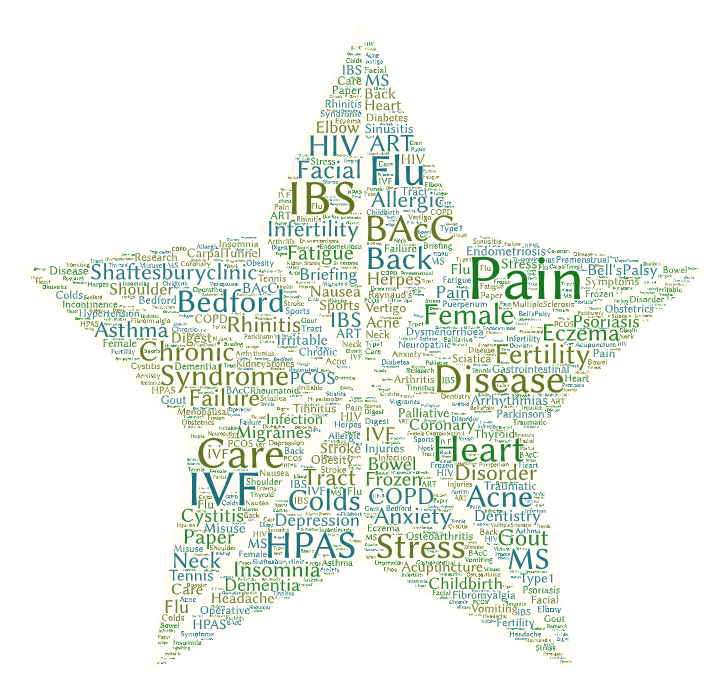Important to know: Chronic health conditions should be addressed under direct medical supervision of your GP or consultant, and acupuncture would be an adjunct or complement to usual care – we advise that you let you doctor know when you use this approach.
Chronic Pain in General
“Acupuncture is effective for the treatment of chronic musculoskeletal, headache, and osteoarthritis pain. Treatment effects of acupuncture persist over time and cannot be explained solely in terms of placebo effects. Referral for a course of acupuncture treatment is a reasonable option for a patient with chronic pain”. (Vickers et al, 2018: large chronic pain review of high quality RCTs updating a previous meta-analysis; 39 trials, n=20827; conditions addressed chronic headache, back/neck pain and osteoarthritis)
Another recent overview (Yin et al, 2017) confirms that there is increasing evidence for acupuncture as an effective, safe, and cost-effective intervention in chronic low back, neck, shoulder, and knee pain, as well as headaches.
The NHS body in charge of which treatments should be used in particular conditions recommends acupuncture for chronic pain: The NICE Scenario Management guidelines (2021) for chronic pain state: “consider a course of acupuncture or dry needling, within a traditional Chinese or Western acupuncture system”
Overall, a large systematic review has found acupuncture a cost effective intervention for several painful conditions (Ambrósio et al, 2012).
Plantar Fasciitis
The British Acupuncture Council has a Research digest where they examined some recent studies on plantar heel pain (plantar fasciitis – link below). Systematic reviews by Thiagarajah (2017) found promising evidence for short term pain relief in the condition, but looked to future long-term studies to improve the evidence base, and Salvioli et al’s (2017) systematic review of the same looked at 20 studies entailing 9 different types of intervention found improvement over placebo, but looked toward future studies to corroborate this.
Mechanisms of Action
Acupuncture stimulates the body to create its own natural painkilling substances, such as Beta Endorphins (β-Endorphin). In studies acupuncture has been shown to stimulate the production of natural painkillers called opioid-like peptides (OLPs), including β-Endorphin: For example, this was shown in an RCT in 90 patients with a range of painful disorders (Petti et al, 1998). The same study showed acupuncture also and enhanced the activity of immune cells (lymphocytes, natural killer cells and monocytes) that help fight infections and diseases (Petti et al, 1998).
About the research: It is worth noting that in research, randomised controlled studies (RCT) are the most reliable in terms of quality of evidence, with a systematic review or meta analysis of numerous studies being the best way of seeing the overall picture of the state of the evidence. Below we have a selection of the available research, which does include some larger RCTs, and reviews of the literature alongside smaller studies. The n= figure tells you how many people were participants in the study.
References:
Chronic Pain References:
Ambrósio, E.M.M., Bloor, K. and MacPherson, H., 2012. Costs and consequences of acupuncture as a treatment for chronic pain: a systematic review of economic evaluations conducted alongside randomised controlled trials. Complementary therapies in medicine, 20(5), pp.364-374.
Birch, S., Lee, M.S., Alraek, T. and Kim, T.H., 2018. Overview of treatment guidelines and clinical practical guidelines that recommend the use of acupuncture: a bibliometric analysis. The Journal of Alternative and Complementary Medicine, 24(8), pp.752-769.
NICE 2021 Chronic pain: Scenario: Management Last revised in April 2021
Petti, F.., Bangrazi, A., Liguori, A., Reale, G. and Ippoliti, F., 1998. Effects of acupuncture on immune response related to opioid-like peptides. Journal of Traditional Chinese Medicine 18(1), pp.55-63.
Vickers, A.J., Vertosick, E.A., Lewith, G., MacPherson, H., Foster, N.E., Sherman, K.J., Irnich, D., Witt, C.M., Linde, K. and Acupuncture Trialists’ Collaboration, 2018. Acupuncture for chronic pain: update of an individual patient data meta-analysis. The Journal of Pain, 19(5), pp.455-474.
Yin, C., Buchheit, T.E. and Park, J.J., 2017. Acupuncture for chronic pain: an update and critical overview. Current opinion in anaesthesiology, 30(5), pp.583-592.
Plantar Fasciitis Refrences:
Salvioli, S., Guidi, M. and Marcotulli, G., 2017. The effectiveness of conservative, non-pharmacological treatment, of plantar heel pain: a systematic review with meta-analysis. The Foot, 33, pp.57-67.
Thiagarajah, A.G., 2017. How effective is acupuncture for reducing pain due to plantar fasciitis?. Singapore medical journal, 58(2), p.92.

